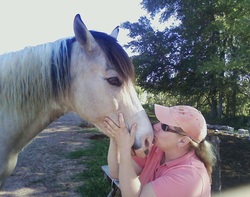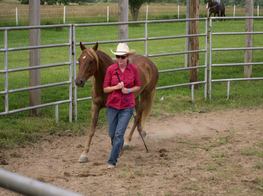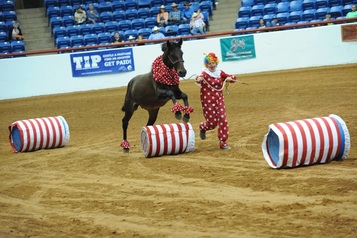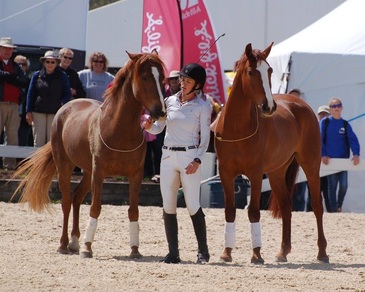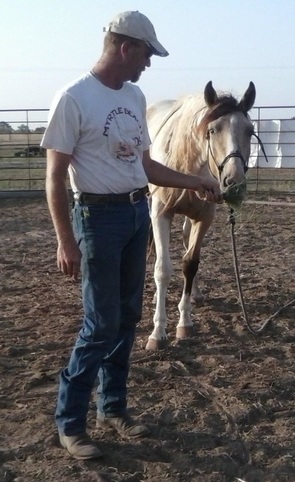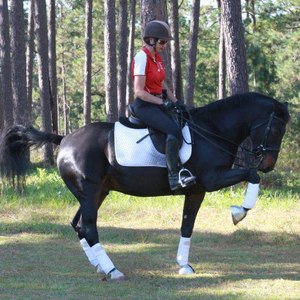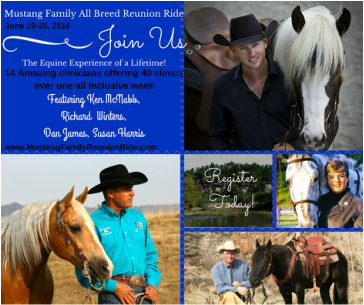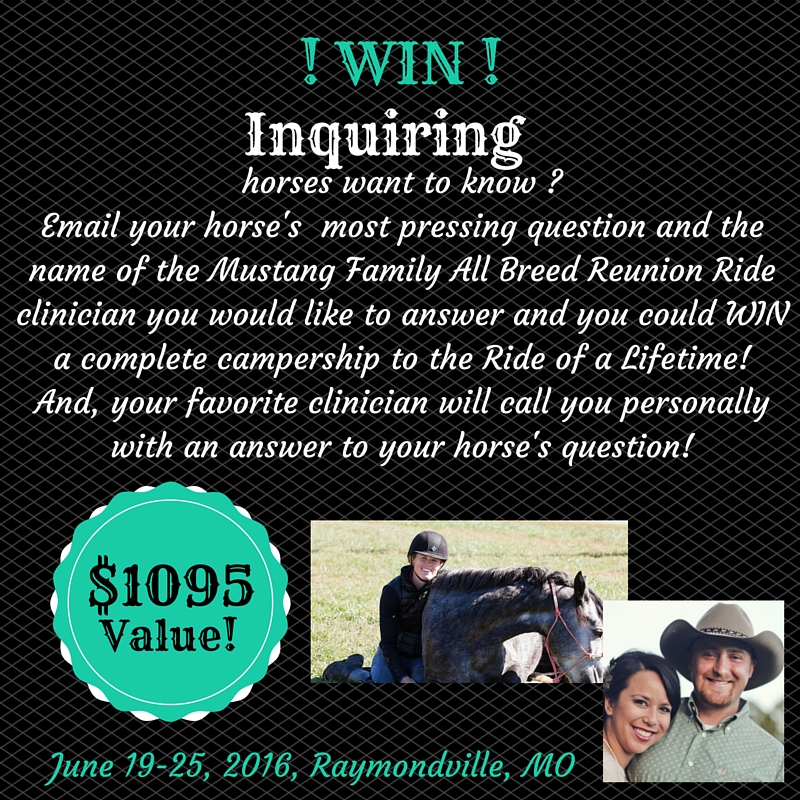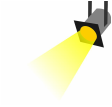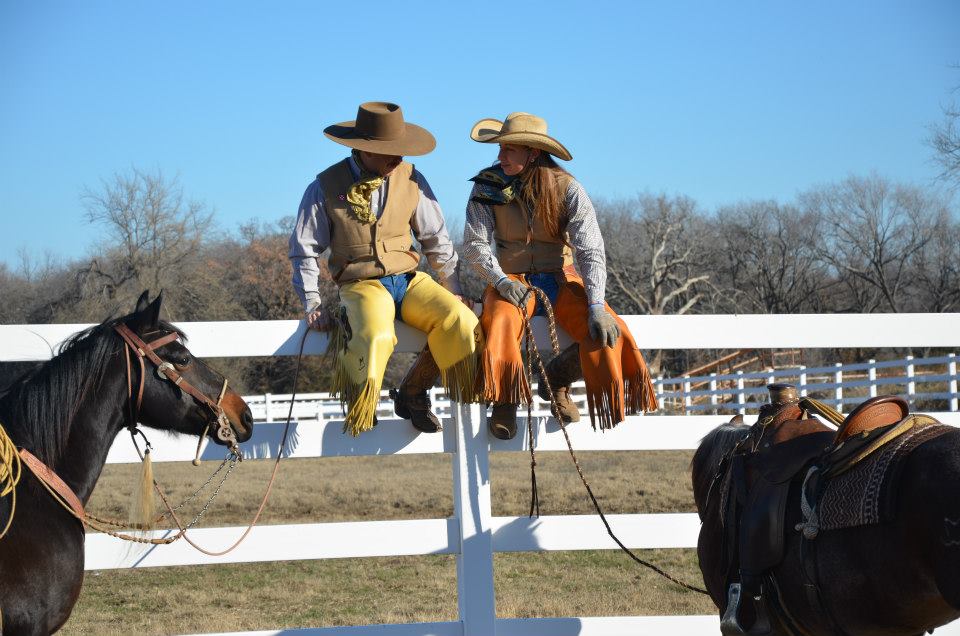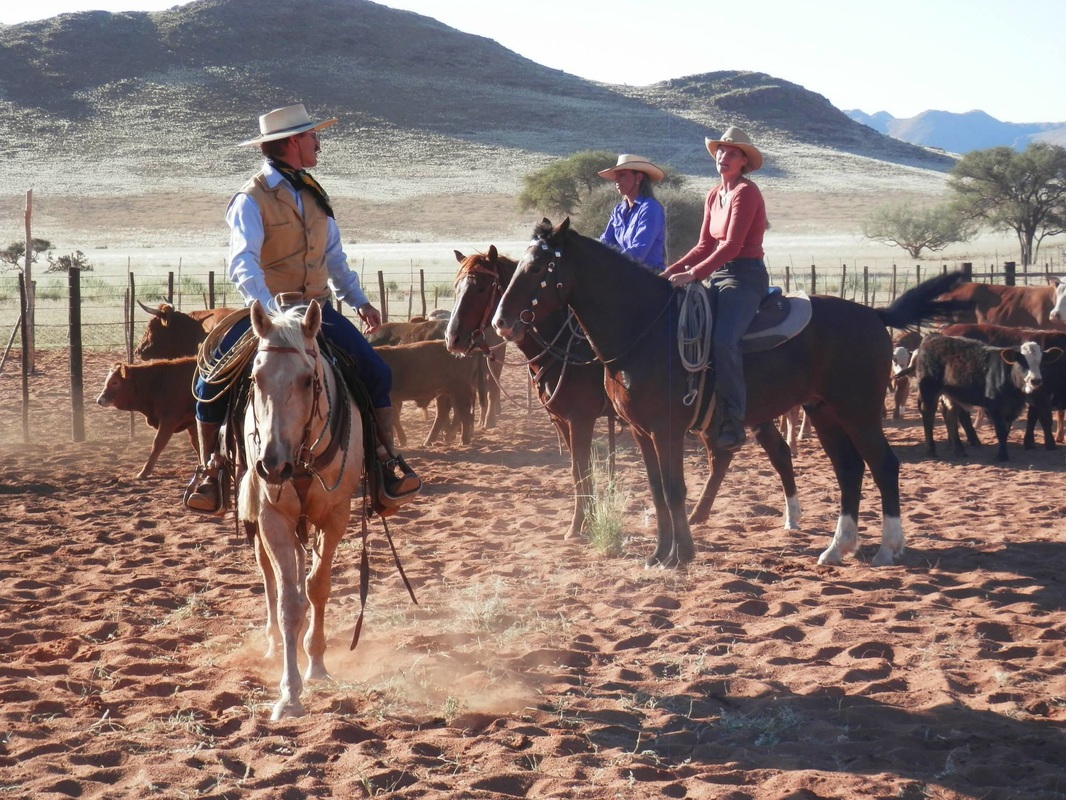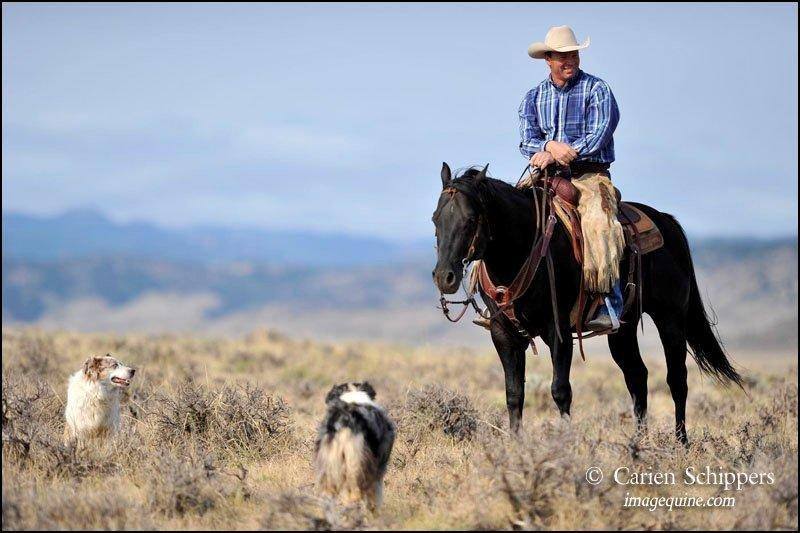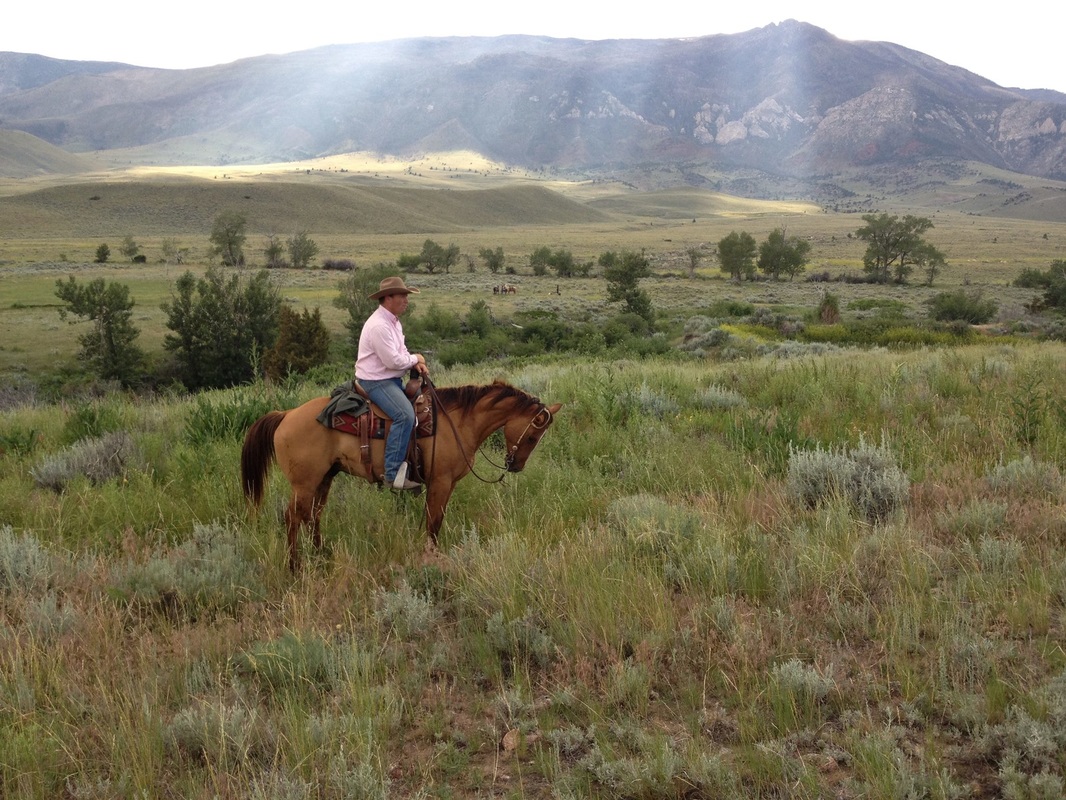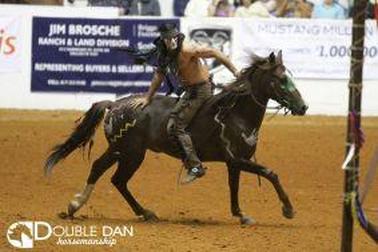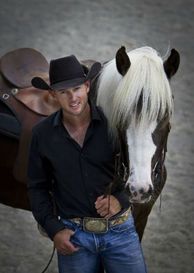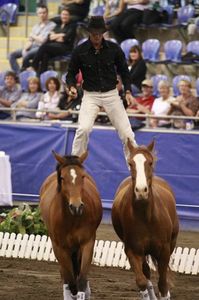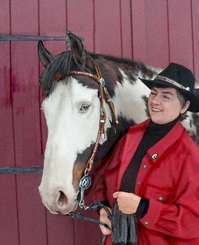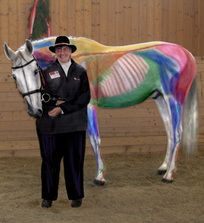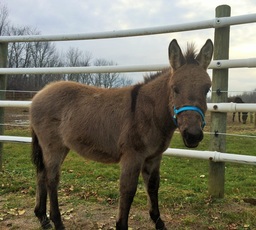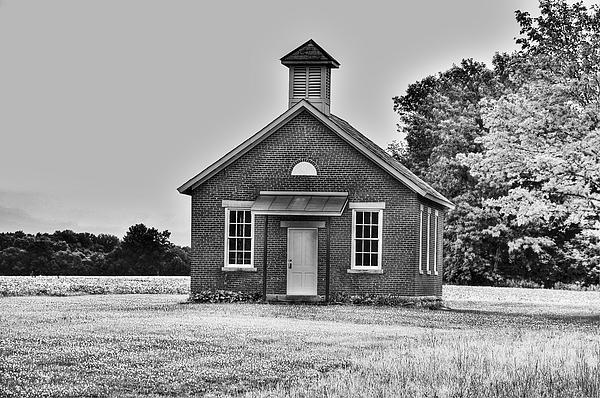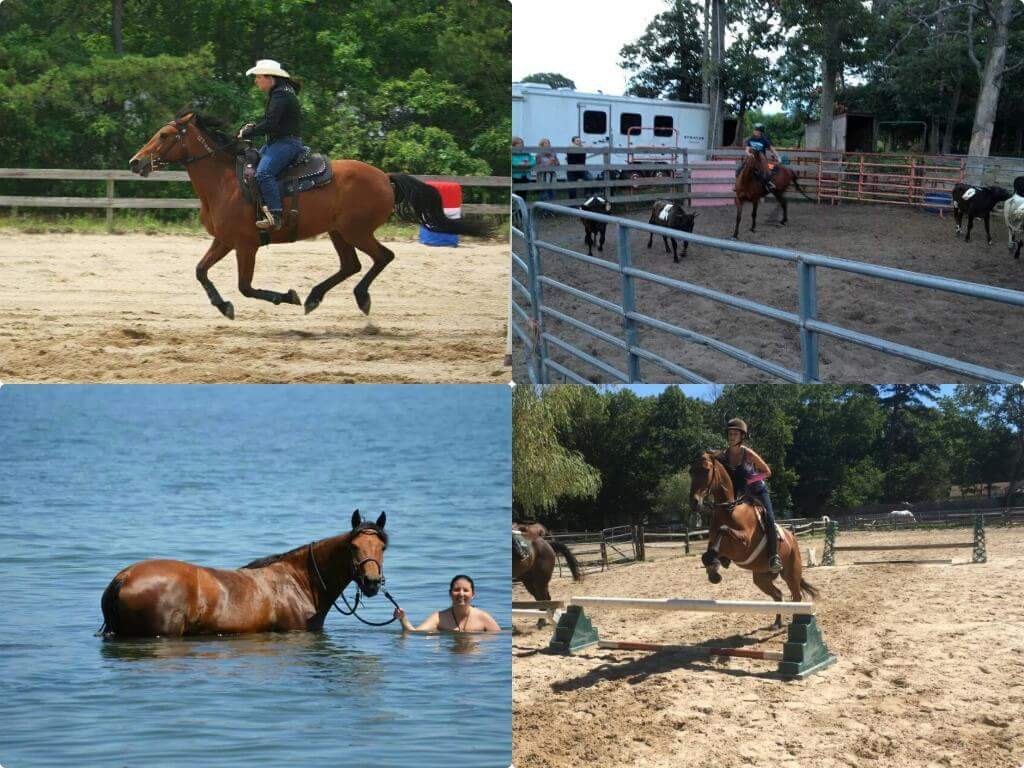TRAINER TIPS |
|
|
This is the last in a series of articles written by Laura Scott Dawson, producer of the Mustang Family All Breed Reunion Ride, and enthusiastic proponent of mustangs. She has owned mustangs for over 20 years and currently enjoys eight uniquely individual mustangs on her Texas ranch. That number, as Laura says, is ALWAYS subject to change!
|
Earlier in the Mustangs vs. Domestics series of articles, published in previous issues of the Wild Heart Mustangs™ e-zine, Laura Scott Dawson discussed the physical (February 2016 issue) and mental (March 2016 issue) characteristics that differentiate mustangs from domestic horses. In Part 3 of the series, Dawson addresses the unique learning styles that affect the “trainability” of Mustangs and domestically-bred horses. She has extensive experience with both kinds of equines, having bred and raised American Quarter Horses and American Paint Horses before wild mustangs entered her life.
Pictured left: Candace Snow at Dan James Liberty class at Mustang Family Reunion Ride 2015. Please note: the photos that accompany this article show different stages of training, as well as the various ages, disciplines, venues and abilities of the trainers. |
Mustangs vs. Domestics - Part 3
by Laura Scott Dawson
When I was first approached to share my thoughts with Wild Heart Mustangs™ readers on the differences between mustangs and domestics, I realized they are very different in three distinct areas: body, mind and trainability. While both types of horses share equally in my life and heart, mustangs definitely have some advantages. These differences have come about from opposing ends of the evolutionary scale. On the one end, mustangs have evolved over many years to have survival traits. Sort of a “nature knows best” trial by fire - if you didn’t develop these attributes, you didn’t survive to pass on your DNA. How many generations a group of mustangs has been subjected to this natural evolution definitely influences how far removed from domestics they can be. Those who have been running wild in our American west for over 350 years possess a higher degree of these differences than those who joined the wild 50-75 years ago. At the same time as mustangs were being formed by nature, man has been breeding and influencing change in domestics. The results of these two forces, man and nature, have many times created a very different creature from the same species!
THE CLEAN SLATE MUSTANG
|
While the way a mustang looks and thinks is interesting to many people, ultimately they want to know: how trainable is a wild horse? Can it really ever be domesticated and made part of our lives - as a pet, a service animal, a sporting team member, a reliable leisure time partner? In some ways, a domesticated horse has an advantage when it comes to learning and accepting training by humans - they’ve been there, done that. But even in the area of "trainability", I believe the mustang has some very real differences and advantages over a domestic horse.
One of the biggest differences between the two types of horses is in the background they bring to the learning situation. Mustangs fresh from the wild are a “clean slate”. They harbor no preconceived ideas of how to respond, have acquired no bad habits, nor resentment from poor treatment by humans. Even the best raised domestic may have had some well intended but poor horsemanship technique applied which will result in something that needs to be unlearned or replaced with better responses. The mustang is a true mirror of YOUR individual horsemanship techniques. A clean slate mustang often receives a trainer’s very best effort. Its “wild” reputation makes trainers careful and complete in their methods. They make no assumptions that the horse must already know some task. Trainers tend to break things down into smaller bites of information and experiences for a mustang. I think this trainer desire to work with a clean slate is why the myth that older mustangs are too hard to train came about. Domestics usually have a blank window of training open for a brief time - until around age two - and after that someone surely has attempted to train them something, right or wrong, and colored that page for everyone who follows. For years, many domestics were started during that magic window and all older horses were thought to be lost cases. Mustangs are still a blank page as it pertains to training well into mid-life. I have seen countless examples of successfully gentled and trained mustangs who are five, six or even ten years of age! Older mustangs maintain a high level of curiosity. I have experienced many more mustangs who display curiosity during training than domestics. It is exactly this questioning and thirst for more information which makes it easier to train a mustang in many cases. Couple this curiosity with legendary mustang intelligence, and a careful and competent trainer can plant new information into a very willing mind! Watching a mustang explore his new world and tasks is a very rewarding part of training! Another area in which mustangs differ in training from domestics is their dislike for repetition. A mustang’s curiosity is piqued to learn a task but once it has mastered the task, they are not fans of repeating it over and over. More of my domestics are content with drilling a skill - like reining circles or working a trail obstacle - than are my mustangs. I have better luck by creating new situations to train or practice the same maneuver with my mustangs. For example, I might change the venue from the arena to the pasture to the trail. Or I will train a skill for 15 minutes and then move to another task or two and circle back to that task. Mustangs are much happier to complete a task they can see a reason for. Jennifer Deden Freestyle program at the
Extreme Mustang Makeover competition Elisa Wallace with Rune and Fledge giving
a demonstration at a Three Day Event |
Eric Dawson and Lonestar L Cowboy
in the first days of training Marsha Hartford Sapp and Cobra
demonstrate the Spanish Walk Finally, because a mustang is so adept at herd dynamics and relationships, natural horsemanship techniques that utilize those dynamics are very successful with mustangs. A look is often all the pressure a herd-seasoned horse needs from a superior to make a move. A domestic horse may not have ever had the opportunity to learn this subtle communication. A savvy trainer can key into this herd communication, once they have earned the leadership position and make big and lasting training changes to a mustang. Some domestic training is slowed down so the trainer can teach the language to the horse - i.e. reinforce the cues and give them meaning before forward progression in learning can happen.
Because of a mustang’s clean slate, intelligence, curiosity and adept herd dynamics, I believe anyone with time, patience and a beginning knowledge of natural horsemanship can train a mustang. I have seen them transformed into willing, trusting, athletic and reliable partners in many disciplines. Mustangs have reached the highest level in competition and worked with all skill levels and ages of riders. A mustang can be found to fill any equine need you might have. While domestic horses have been bred to specific niches in modern society, a mustang was quietly being prepared by Mother Nature to also be a good fit for our lives. Ultimately, I find the differences between mustangs and domestics very interesting, and I intend to keep both an active part of my life! |
THE MUSTANG FAMILY ALL BREED REUNION RIDE
Good news! The event's registration deadline has
been extended to May 25th, 2016.
Event Dates: June 19 - 25, 2016
been extended to May 25th, 2016.
Event Dates: June 19 - 25, 2016
|
Inquiring Horses Want to Know Contest Rules:
One entry per person. Winner will be randomly drawn and contacted by MFRR and the chosen clinician. Prize is valued at $1095 and includes entry to the event, access to all clinics, use of a camping space with water & electric, covered stall, three meals daily, activities, camp amenities and use of 250 miles of trails. Prize is not transferrable or redeemable in cash. Travel expenses are the responsibility of the winner. Include a day time contact phone number, mailing address, email and name with your entry. Neither Wild Heart Mustangs™ e-zine or Mustang Family All Breed Reunion Ride are responsible for lost or misdirected emails/entries. Employees and their families of either company are not eligible to win. Click on the contest photo at the right for a printable file of the event schedule and contest rules. |
Wild Heart Mustangs™ is excited to present a Mustang Family All Breed Reunion Ride Contest!
Inquiring Horses Want to Know Contest Details: Please email your question and the Mustang Family All Breed Reunion Ride clinician’s name that you would like to answer your question mail to: [email protected] by midnight April 16, 2016. You may choose from Ken McNabb, Dan James, Richard Winters, Susan Harris, Mark & Miranda Lyon, Elisa Wallace, Marsha Hartford Sapp, Mary Miller Jordan, Chad & Christiana Wenger, Steve Smith, Greg Robinson, Lanny Leach or Cindy Brasfield. |
The Mustang Family All Breed Reunion Ride is an all-inclusive week featuring 14 of the very best clinicians offering over 40 clinics. Any way you add it up equals the equine experience of a lifetime! In the February issue of the Wild Heart Mustangs™ e-zine, we brought you the concept behind this unique equine experience. Our March and April issues introduce you to some of the clinicians you'll have an opportunity to live and learn with at the June 2016 event. The event's featured clinicians are Ken McNabb, Richard Winters, Dan James and Susan Harris. They're supported by Marsha Hartford Sapp, Mark & Miranda Lyon, Lanny Leach, Cindy Brasfield, Steve Smith, Mary Miller Jordan, Chad & Christiana Wenger, Greg Robinson, Elisa Wallace and BJ & Maryanne Grimmett.
These trainers and more will participate in the 2016 Mustang Family All Breed Reunion Ride.
For profiles of other clinicians at the event, see the March 2016 issues of the Wild Heart Mustangs e-zine.
For profiles of other clinicians at the event, see the March 2016 issues of the Wild Heart Mustangs e-zine.
|
MARK & MIRANDA LYON
Mark and Miranda Lyon are the husband wife team that makes up M & M Horsemanship. Together they bring decades of fine horsemanship-training both horse and rider. They utilize the natural horsemanship methods first made popular by greats like Ray Hunt and Buck Brannaman to bring out the best in all types of horses and skill levels of riders. They have been a dynamic part of the Extreme Mustang Makeover competitions from the beginning-placing, winning with multiple horses every time they enter. They have also coached and assisted many other winners, both youth and adults! They specialize in starting colts and refining older horses and have traveled the world, including Africa, to share their knowledge and skills. A joy to watch, in their classic western styles, they are helping to revive the vaquero traditions of old west. While at the Reunion Ride, Mark and Miranda will present four interesting and informative clinic sessions:
What were your first thoughts about owning and training a mustang? "My first thoughts about owning and training a mustang are that they are just like a domestic breed that is raised in the same fashion of being born out on a ranch without human contact to live for themselves. The geographical location of said ranch or HMA will influence how much the horse has dealt with minimal or extensive natural predators, and how much they have to rough it to find food and water. These scenarios affect how "street smart" a mustang or domestic horse reacts to things. I have had and seen mustangs that gentle very quickly and reliably as well as those who gentle slowly and stay very cautious. I have seen people’s hearts get broken because the mustang they want to be easygoing is just not that type of personality, while someone who wants an athletic performance type mustang may get one that doesn't have the desired natural athleticism." Do you have a favorite mustang? "My favorite mustang is my Million horse, Atlas. He was the toughest, most introverted mustang I have owned and he taught me a lot of different approaches to different scenarios. He taught me to step back and take a look at what I am doing to make sure he felt it was fair, but to not let my guard down for him to take advantage of me. He is not a horse for most, but has loads of talent for the ones that want it. But you as a horseman have to work for it and be patient to get it." Do you change anything in your training methods for a mustang versus a domestic? "I change anything in my training methods for any horse that tells me they respond better for it. It is up to me as a horseman to help the horse understand what I want him to know versus expecting him to know what I want without showing it to him. I have experimented with so many different ways to ask for the same things and find that most of them work better or worse for different horses. I feel this way about both my domestic and mustang horses. They all have their own personality and it is up to us to understand how that personality and the physical habits of that horse respond to your actions and physical cues as communication." |
Mark & Miranda Lyon
Mark and Miranda Lyon riding in South Africa
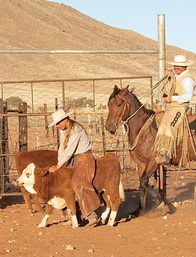
Mark and Miranda calf riding
|
|
Ken McNabb with his cow dogs
Ken McNabb in the mountains
|
KEN McNABB
“A true blue American cowboy with a boyish enthusiasm for life and strong family values, Ken McNabb grew up in a traditional ranching family in the mountains of Wyoming. This modern-day Roy Rogers knew from a young age that he wanted to help others gain the knowledge and confidence to achieve a new level of horsemanship. Ken creates a unique environment where each horse is trained using gentle methods and the rider is coached to become their personal best. Ken's faith in Christ, along with his commitment to strong family values and patriotism, help make him the kind of speaker/trainer people enjoy.” This excerpt is from Ken’s website and is one of the very best descriptions of him I have ever seen. He travels around the country and the world and appears weekly on his RFD TV series bringing very practical, easy to understand and implement horsemanship techniques. He’s warm, engaging and approachable for every skill level and age of rider. This will be Ken’s third year with MFRR and we consider him to be a foundation stone in the mustang family! While at the Reunion Ride, Ken will present four interesting and informative clinic sessions:
What were your first thoughts about owning and training a mustang? “They are a wonderful breed of horse; however if you are a beginner you will need to seek help from an experienced professional.” Do you have a favorite mustang? “My all-time favorite mustang was a wild horse in the Pryor Mountains when I was a little kid. His name was Seattle. He was a big sorrel stud horse that would walk our fence line on his way to water every day. He stayed wild until his death. I liked to think as a kid that he and I were friends as I would watch him for hours each day. He definitely inspired my life’s work.” Do you change anything in your training methods for a mustang versus a domestic? “The only change that I would make in my training program for mustangs is to slow down at first until they trust me.” |
|
DAN JAMES
Brush up on your “Aussie Speak” and you will definitely enjoy your time with horseman Dan James. Born in Queensland, Australia, he brings half of the Double Dan Horsemanship team to our side of the world. He has appeared all over the world performing with his liberty horses and competing in colt starting and reining competitions. No one will ever forget his Tonto freestyle reining performance that featured bridle-less, tack-less, spins, slides and even loping while sitting backwards. He won the Kentucky Gold Cup Reining Freestyle with that routine adding that award to an already long list of accomplishments. He is also a winner of the prestigious Road to the Horse colt starting competition and a finalist in the Mustang Million, mustang training competition. Talented and enthusiastic about helping people and horses reach their goals, he is also kind, funny and easy to work with. By helping you build a relationship with your horse he will have you performing both at liberty and under saddle in ways you have only dreamed of! While at the Reunion Ride, Dan will present four interesting and informative clinic sessions: Liberty Body Control Under Saddle Creating a Freestyle Performance Liberty From a Ridden Horse |
Dan James
|
|
Susan Harris
|
SUSAN HARRIS
Susan E. Harris is an international clinician, riding teacher, equestrian author and artist from Cortland, New York. She has taught all seats and styles of riding, and has trained, shown, and prepared horses and riders for competition in many equestrian disciplines, including hunters, jumpers, dressage, equitation, eventing, western pleasure and performance, saddle seat, and the pleasure and versatility breeds. She is the author and illustrator of the three U.S. Pony Club manuals. Her artwork is best known when seen “in the flesh” during one of her popular “Visible Horse” demonstrations in which she paints the bones and muscles on a live horse. Susan is also one of the premier students of Sally Swift’s Centered Riding method which helps riders in all disciplines achieve balance, comfort and relationship with their horses. A true student of the horse, Susan will bring her warm, encouraging and engaging style to all who seek to improve their riding and their horsemanship! Susan's study of equine and human anatomy and movement as an artist as well as an instructor, rider and trainer, has given her a unique perspective on how horses and riders balance and move together. Centered Riding techniques can help riders discover how to use their bodies better for improved balance and harmony between horse and rider. Susan's knowledge of horse gaits and movement and wide experience in various breeds and disciplines enable her to help all kinds of riders and horses improve their balance, comfort, movement and performance. Her friendly and positive teaching style and visual approach help to make learning clear, understandable, and enjoyable for English and Western riders of all ages and levels. While at the Reunion Ride, Susan will present four interesting and informative clinic sessions:
|
|
Sweet Potato Goes to School
In February we introduced you to the Lainharts' mule, Sweet Potato (read the article here). On March 17th, Sweets and three of his herdmates went off to school, for the start of his formal education by trainers Jack and Emma Minteer. See the photos and story here. |
Photo c. Wayne Hennebert
|
NEWS FROM A READER
|

